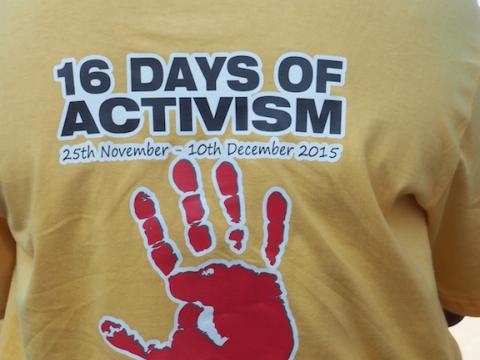World Vision has hope for an end to gender-based violence

Gender-based violence is a significant problem in the Solomon Islands, where two out of three women and girls have experienced some sort of violence. The recent 16 Days of Activism drew a lot of attention to the problem but World Vision Solomon Islands is now calling on authorities and development partners to focus on solutions rather than statistics.
“We are well informed that the level of gender-based violence in this country is very high, but now it is time to focus on actions,” says Janes Ginting Country Director of World Vision.
One initiative that appears to be working is World Vision’s Community Channels of Hope (CCoH) program, supported by the Australian Government’s aid program.
Gender-based violence is a significant problem in the Solomon Islands, where two out of three women and girls have experienced some sort of violence.
The project is based on the successful Channels of Hope (CoH) method, which World Vision has previously used in Africa to combat HIV and AIDS. In 2013, World Vision piloted the scheme to address gender-based violence in Solomon Islands.
CCoH uses faith-based approach to change attitudes and behaviours. The aim is to improve gender relations within families and reduce all forms of violence by engaging faith leaders, local police, nursing aid posts, clinics and other motivated members of the community. The project also links survivors to support services and helps in addressing issues of substance abuse and conflict.
World Vision has rolled out the project in 30 communities in Weather Coast and Temotu. They have trained 112 men and women in CCoH or gender-based violence prevention messaging and helped set up 29 community action teams. Overall, 690 people have participated in gender-based violence awareness activities in the last 2 years, 66% of which were men.
Women in the project communities said that for the first time they had the tools and confidence to discuss issues of violence in their own homes.
The scheme has achieved some positive results.
In a recent independent evaluation led by University of Queensland, Australia, women in the project communities said that for the first time they had the tools and confidence to discuss issues of violence in their own homes.
There appears to have been a change on the ground as well. In the Weather Coast communities, 56% of people reported a decrease in gender-based violence, while in Temotu, 61% of community members saw a decrease.
“Attitudes are changing,” says Ms. Koisau Sade, World Vision's Gender Sector Portfolio Coordinator.
“Before the project began, 59% of Weather Coast respondents disagreed with a statement that the bible says men are superior to women. After the project, this number rose to 78%. That is a great result.”
Temotu saw a smaller increase, with 63% disagreeing before the project and 67% afterwards. World Vision admits that the project has not been a complete success and there is a lot of room for improvement.
Access in particular was a significant issue. The remote location of the target communities in Reef islands and St Cruz islands of Temotu and in Weather Coast area programs, are often difficult to reach due to bad weather. Also to ensure that everyone in the community was available, facilitators frequently carried out awareness messaging in the evening.
“When the survivors seek help, including when further referral support is required, it is not always available,” says Mr. Ginting. “Plus we must understand that gender-based violence is still a very sensitive issue that many find hard to share.”
The evaluation has made some recommendations and World Vision’s next step will be enacting those recommendations.
The Family Protection Act (2014) makes it clear that all forms of domestic violence are against the law, including physical, sexual, psychological or economic abuse. CCoH aims to reinforce this position by complementing law changes, and efforts to restore peace through kastom. However, change relies on the cooperation of local authorities and lawmakers to ensure perpetrators are prosecuted and support systems are readily available.
“Behaviour changes does takes time, and it may take one generation. But, what we're observing now is that we have a sign of hope that changes are possible and it is happening. Women felt more empowered to speak up and to seek help. Men are more open to talk about it. Faith leaders are courageous to promote awareness on this issue on their regular sermons. Police are more responsive when receiving report from survivors/families or community facilitators and we now have a legal framework to better protect the survivors. We shall build on this momentum and work together to realize many more hopes to address gender-based violence in Solomon Islands,” says Mr Ginting.
The Australian Government supports the Community Channels of Hope project.